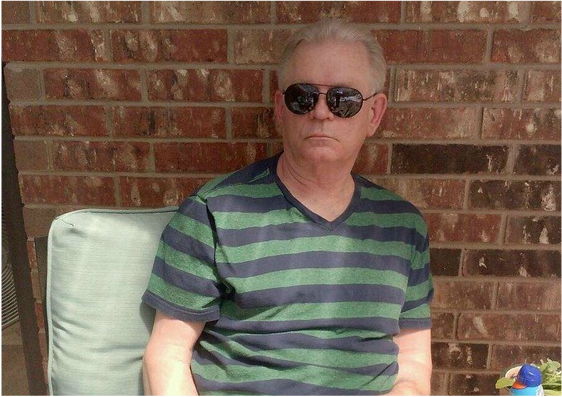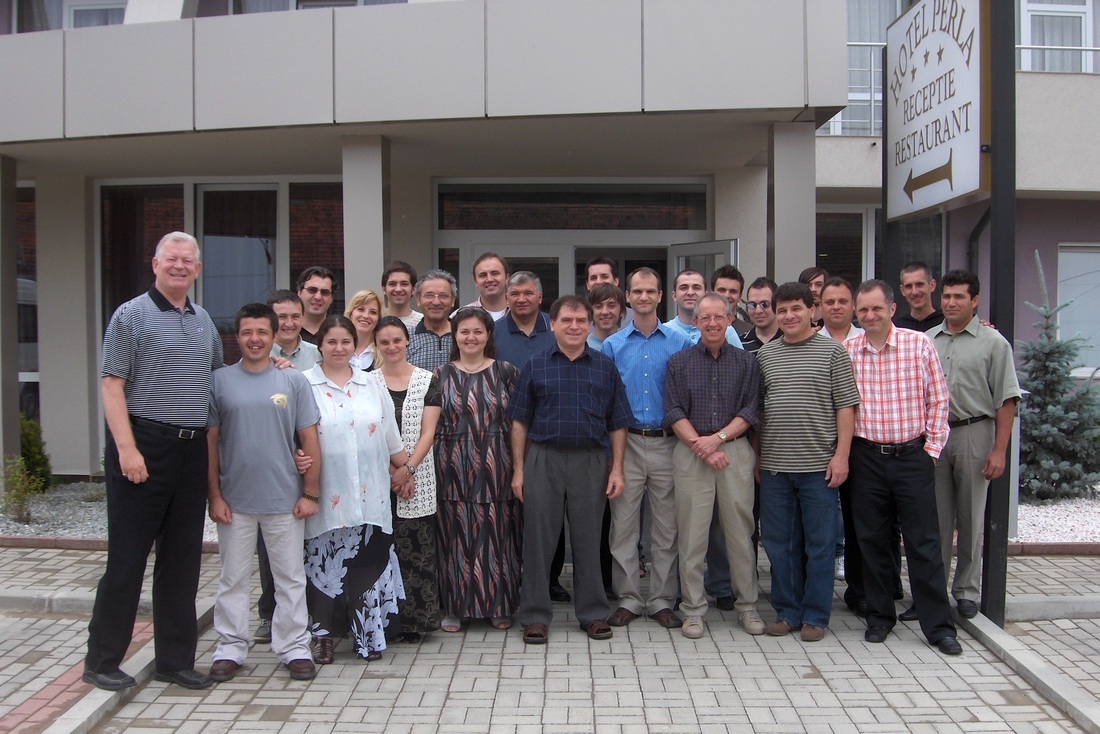|
One of the early challenges with Randy, after being diagnosed with a form of dementia, was the fact that while his brain was fighting a disease, initially his body was as strong and healthy as ever. He still looked strong, tall and handsome. This then added to the confusion of people who 'saw' the old Randy but knew something was terribly amiss if they attempted a conversation. This also added to my stress when out in public with him because no one expected him to do, say, or act out the way he did, explanations were always awkward but needed.
Not recognizing friends and family, and lack of judgment in social settings were only a couple of the symptoms. Soon he began to display some obsessive compulsive behavior. He still wanted to watch his favorite Dallas sports teams so I would make sure I checked the schedule and found it on TV for him. It was a peaceful break for me because I did not have to be on guard duty. He, however, developed a little routine that had to be adhered to each and every time he was sitting in his favorite chair in the family room. He must have three glasses of water and three bowls with snacks in them. It couldn't be two or four glasses or bowls...it had to be three. I always prepared these for him because if I did not he would get into the toothpicks, raw eggs, he even found some broken glass one time, and put these in the bowls for his snacks. The constant monitoring was draining to say the least and I had to eventually resort to putting locks on all of the cupboards and refrigerator. He began to walk around our kitchen table or the backyard pool in circles counting or I should say, trying to count to 100. He also waved at our backyard lighting fixture saying it was somebody and would go out to it during the day and talk to it and sometimes reach up and kiss it. I tried once to question him about it but the agitation it produced was not worth it. I can barely describe the despair and grief that tried to consume me as I watched this strong, healthy, handsome man turn into a childlike image of himself. I missed talking to him about our family, about ministry, and about our plans for the future. He looked the same...but he was not the same! I cried myself to sleep most nights. Three thoughts:
It's hard to describe how things were when my dad first got sick. It was so gradual and strange. We Bozarth guys are kind of eccentric and goofy just by default, so when Dad started doing strange things it was difficult to identify and point my finger on what exactly was going on. It wasn't that he was doing things so outside the scope of normal, it's that, he had no judgment on when to stop doing certain things. Contrary to what alot of his former students may know or think, my dad was always extremely goofy. When he started having symptoms, the symptoms were just a more strange type of goofiness and with each passing day he lost more and more of his judgement and ability to read people and situations...something he was always really great at doing.
Now when he would preach, he would preach way too long and not realize it was time to wrap up. Maybe that's a problem most preachers have, but with dad, it was markedly different. Now he would shake someone's hand and swing it back and forth in a strange way that was almost scary to the person he was shaking hands with. Now he was hiding behind pillars in public places acting like a 5 year old. When people first hear the word Alzheimer's or Dementia they immediately think, "oh, he doesn't remember where his keys are anymore," not a big deal right? No, that characterization couldn't be further from the truth. I can only speak to Dementia and not Alzheimer's in general, but my dad's symptoms were not just simply forgetting little things here and there. His judgement was deteriorating. He thought certain things were OK to do that were not OK. Talk about role reversal and life flipping upside down. My dad used to be the one telling me I was talking too loud. My parents were pastors when I was a kid so I often went out to eat with them and some leader from somewhere. I remember in the car on our way to eat my dad would always tell me to be "calm, cool and collected." Now it was me telling my dad to be "calm, cool and collected," only he was a 6' 4", 235 lbs person who wouldn't always listen to my admonition. I wasn't looking to discipline my dad, just somehow make already awkward situations less awkward and escape somehow. I can't express how much anxiety these situations caused my mom, my family and me. It was especially difficult before we got an official diagnosis, because we really didn't know what was going on. I didn't know what to say to people. Something was obviously wrong, but what could I tell people? I had nothing. I would just blame it on stress, or a mid-life crisis. Who knows what I came up with? Looking back, I have no idea how we made it through some of those days. The picture at the top was taken on our last international mission's trip together in 2008. My dad and I went to Romania to speak at a Pastor's conference. What a stressful trip that was. My dad was acting so strange. I mentioned hiding behind pillars. Well imagine a setting, surrounded by a bunch of Romanian leaders who have come to listen to my dad talk about leadership, and he his acting goofy hiding behind pillars in the lunch room and acting so strange. You may ask me why we let him go on such a trip. We probably shouldn't have, but we still didn't know what was wrong. We thought maybe he was just stressed or something and maybe getting out of the country like he used to do could help him snap out of whatever he was dealing with. Yeah, for awhile there we hoped he would just snap out of it. He never did. -Chad Bozarth Three things I learned that could help you:
The question in 2006 that changed our path that night, “who are they?” in response to a comment I made about seeing old friends, began a journey that continues today. My immediate thought was to make a doctor's appointment with our family physician believing and hoping we would receive a diagnosis of 'overworked,' 'stressed,' etc. but it was not. The look of concern on the doctor's face spoke volumes to me, although I don't think Randy caught on at all. The doctor suggested that our next step was to make an appointment with a neurologist that he recommending.
I quickly contacted this neurologist and the appointment was set. The day of the appointment was busy like any other day and I just wanted to get in and out with an easy diagnosis of anything that was fixable. We went and sat in the waiting room with a sense of anxiousness and irritation permeating the entire atmosphere. A short meeting with a less than compassionate neurologist ended with a diagnosis of early onset Alzheimer's. He was 57 years old. Funny, I thought, I was hoping she would say it was a tumor or something, anything that could be removed or fixed! We left that office stunned, and angry, “it's a lie,” I said, "that's not what you have." So began a series of personal tests and trials all pointing to the reality that something was definitely wrong. The phone calls were what I initially dreaded the most, “I ran in to Randy today, what's wrong with him?” “Did he have a stroke?” “He's acting funny, using bad judgment etc.,” “Susan, I hate to say this, but something is wrong with Randy.” and on and on and on they came. The more I attempted to tell him that something was wrong and other people were worried too, the angrier he got. I felt trapped and alone. Someone recommended a medical facility specializing in dementia with a research program that I might be able to get Randy into. I made yet another appointment grasping for some hope, help, clarity, or answers...none were coming. The doctor examined Randy and came up with a more detailed diagnosis, Frontotemporal Degeneration; basically, the front, right, part of Randy's brain had begun to atrophy. The reality of what was being said sunk in as I stepped out into the hallway and cried. “What in the world am I going to do?” In no short order they had him signed up for a research program dedicated to this disease. I had a moment of hope but it was quickly dashed when I realized the doctor was viewing Randy more like a lab rat than a human with a debilitating disease...I didn't take him back. The personality changes were acute and worsening day by day. I had to get help. I finally got him to a kind, compassionate, neurologist, that was recommended to me by an acquaintance that was also struggling with her husband and the same diagnosis. This doctor was also involved in research but the difference was notable from the beginning. He looked right at Randy and said, “You are my patient, yes, we will be giving you tests etc. that once the results are in, will help a lot of people, but I will be caring for you.” The lie turned out to be true and we made weekly visits to this office for months of treatment and tests which always included blood work, MRI’s and what seemed like hours of questions and interviews...it was exhausting mentally and physically. These weekly visits continued until he could no longer answer questions like, “Can you name a farm animal?” “How many children or grandchildren do you have?” “Who is the President of the United States?” The research for Randy was over. I was now embarking on the next level of this dreaded disease with the path I had to walk looking like a dark, scary, unfamiliar, route that was taking me into uncharted territory. Knowing the diagnosis did not make the path ahead any clearer. Three things I learned that could help you:
|


 RSS Feed
RSS Feed